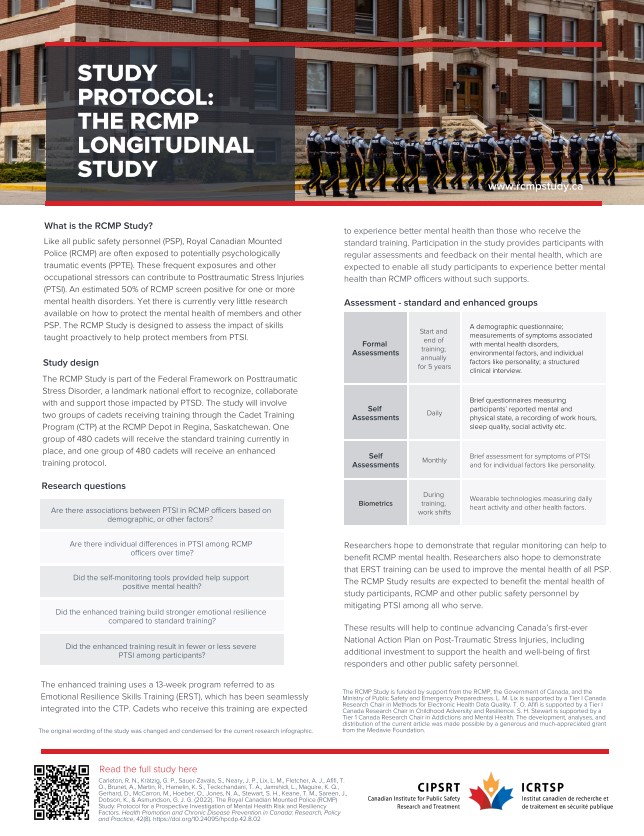Research Summaries
Why is the study being done?
Royal Canadian Mounted Police (RCMP), like all public safety personnel (PSP), are often exposed to potentially psychologically traumatic events (PPTE). PPTE exposures can contribute to Posttraumatic Stress Injuries (PTSI). A prevalence study by Carleton et al. in 2018 indicated that 50% of RCMP officers screened positive for an established mental health disorder. There is, however, very little research available on how to protect PSP against PTSIs. The RCMP is part of the Federal Framework on Posttraumatic Stress Disorder and is designed to:
- develop, deploy, and assess the impact of a system for ongoing annual, monthly, and daily evidence-based assessments; and
- enhance the RCMP Cadet Training Program with evidence-based skills to help protect members from experiencing PTSI.
How is the study designed?
The study will involve two groups of cadets.
| Group 1 | Group 2 | |
| Number of cadets | 480 | 480 |
| Type of training | Standard | Enhanced |
| Formal assessments | Start & End of training
Annually for five years |
Start & End of training
Annually for five years |
| Self-assessments | Daily and Monthly | Daily and Monthly |
| Biometrics used | Yes | Yes |
Enhanced training: Uses a 13-week program developed from the evidenced-based Unified Protocol for Transdiagnostic Treatment of Emotional Disorders, which is designed to address a wide range of anxiety- and depression-related mental health disorders. The new training program has been tailored for the RCMP and seamlessly integrated into RCMP Depot training, and is called Emotional Resilience Skills Training (ERST).
Formal assessments involve:
- completing a demographics questionnaire;
- measurement of symptoms associated with mental health disorders;
- measurement of environmental factors impacting study participants (e.g., PPTE exposures) and individual differences (e.g., personality, mental health care knowledge); and
- a structured clinical interview.
Participants in Group 2 will also be assessed on their retention of the enhanced training skills.
Monthly assessments: Completed by participants to provide them with regular and immediate feedback on current mental health, and to allow participants to track changes in their mental health over time. The assessments support participants accessing evidence-based care earlier.
Daily assessments: Very brief questionnaires that allow participants to reflect and record their mental and physical state in near real-time. Participants can also record work hours, sleep hours, sleep quality, meal consumption, social activity, substance use and gambling, as well as PPTE exposures and other significant events. The assessment creates a detailed record that participants can use to manage their mental health.
Biometric recordings: Can be used by study participants to measure their daily heart activity and health as part of tracking their physical and mental health in near real-time.
What do researchers hope to learn?
The study results will provide valuable information on the mental health of RCMP officers from the start of their training until their fifth year of service. Some of the main questions the team hopes to answer include:
- Are there associations between PTSI in RCMP officers and demographic (e.g., age, gender, education), experiential (e.g., operational stressors, organizational stressors, PPTE exposures), or other (e.g., measures of risk and resilience) variables?
- Are there individual differences in PTSI among RCMP officers over time?
- Did the self-monitoring tools help to support positive mental health among study participants?
- Did the enhanced training build stronger emotional resilience among study participants, as compared to the standard training?
- Did the enhanced training result in fewer or less severe PTSI among study participants, as compared to the standard training?
Cadets who receive the enhanced training are expected to experience better mental health than those who receive the standard training. However, the research team expects that participation in the study, which provides participants with regular assessments and feedback on their mental health, will enable all study participants to experience better mental health than RCMP officers without such supports. The importance of this type of study has already been recognized by other PSP organizations. Currently serving municipal police, paramedics, and firefighters have received the ERST training as part of a related study . The researchers hope to demonstrate that ERST training can be used to improve the mental health of all PSP.
The original wording of the study was changed and condensed for the current research summary.
Original Study
Carleton, R. N., Krätzig, G. P., Sauer-Zavala, S., Neary, J. P., Lix, L. M., Fletcher, A. J., Afifi, T. O., Brunet, A., Martin, R., Hamelin, K. S., Teckchandani, T. A., Jamshidi, L., Maguire, K. Q., Gerhard, D., McCarron, M., Hoeber, O., Jones, N. A., Stewart, S. H., Keane, T. M., Sareen, J., Dobson, K., & Asmundson, G. J. G. (2022). The Royal Canadian Mounted Police (RCMP) Study: Protocol for a Prospective Investigation of Mental Health Risk and Resiliency Factors. Health Promotion and Chronic Disease Prevention in Canada: Research, Policy and Practice, 42(8). https://doi.org/10.24095/hpcdp.42.8.02
Prepared by Kossick, E. Reviewed and edited by Carleton, R.N.
